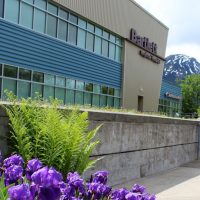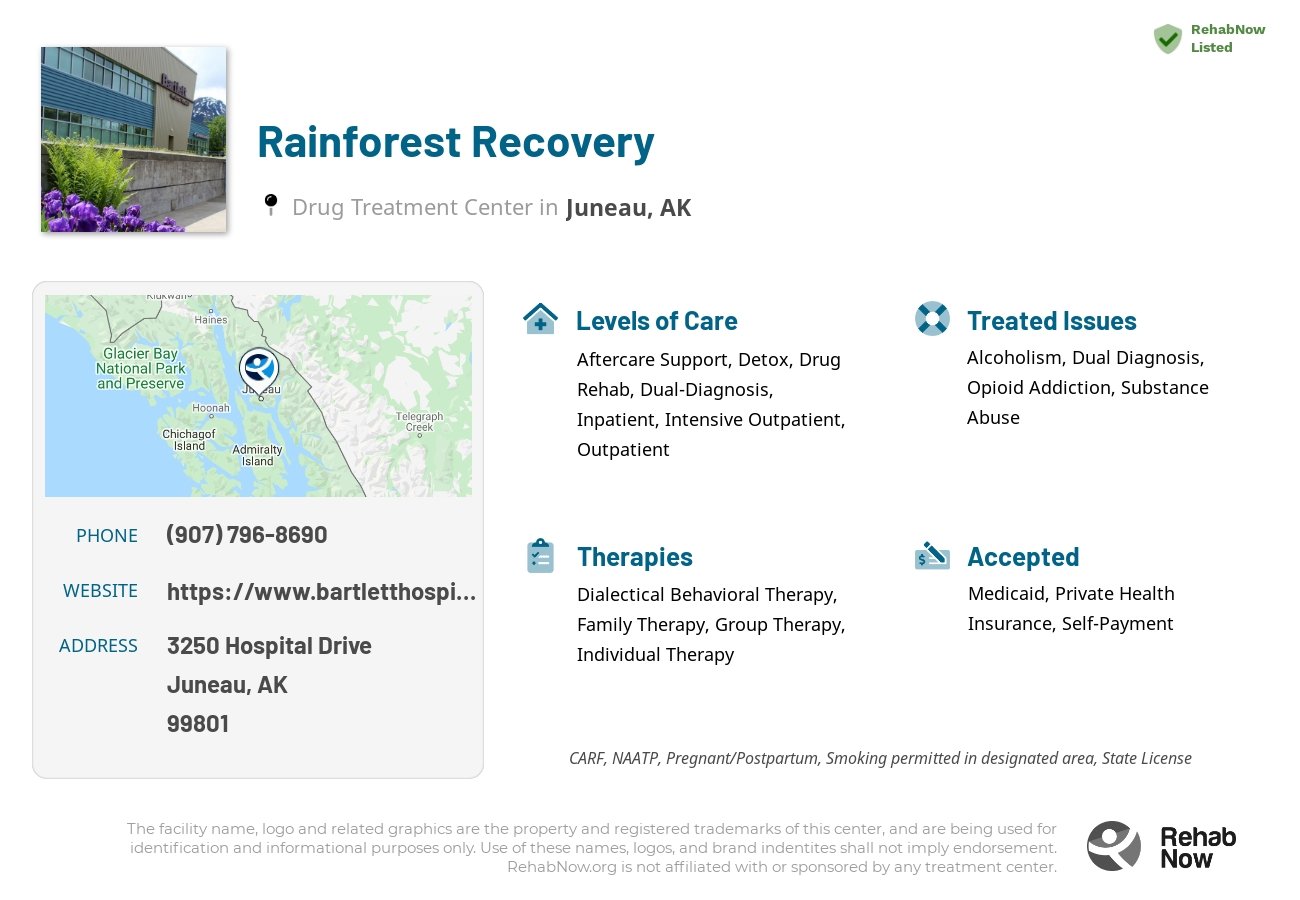Rainforest Recovery
Drug Rehab Center in Juneau, Alaska
Rainforest Recovery is a 16 Bed Addiction Treatment Facility in Juneau, AK that provides Aftercare Support, Detoxification, Inpatient, Intensive Outpatient, and Traditional Outpatient Programs for those suffering from Alcoholism, Dual Diagnosis, Opioid Addiction, Substance Abuse, and Drug Addiction with Private Health Insurance accepted.
About Rainforest Recovery in Alaska
Rainforest Recovery is a drug treatment facility located in Juneau, Alaska. With a capacity of 16 beds, Rainforest Recovery offers a range of services to individuals struggling with alcoholism, drug addiction, opioid addiction, substance abuse, and dual diagnosis. The facility is affiliated with Bartlett Regional Hospital and accepts private health insurance. Rainforest Recovery provides an array of treatment options, including detoxification, inpatient care, and intensive outpatient programs, allowing individuals to receive the level of care that best suits their needs.
At Rainforest Recovery, individuals can expect a comprehensive approach to addiction treatment. The facility offers aftercare support to help individuals maintain their sobriety once treatment is complete. With a focus on dual diagnosis, Rainforest Recovery addresses the complex relationship between substance abuse and underlying mental health conditions. Whether through inpatient or outpatient programs, the dedicated staff at Rainforest Recovery provides personalized treatment plans tailored to each individual's needs, helping them overcome addiction and achieve long-lasting recovery.
Genders
Ages
Modality
Additional
Conditions and Issues Treated
Some addicts can benefit from substance abuse treatment, which is designed to help them become and remain sober without the use of medications. These programs are typically used by those struggling with drugs like marijuana or hallucinogens. However, they might be beneficial for those with a co-occurring mental health disorder like schizophrenia, major depression or bipolar disorder.
During this type of treatment, the addict will meet with therapists and other professionals on a regular basis to learn coping skills and healthy ways to deal with their addiction and mental health disorder.
Treatment programs often combine medications with counseling, support groups and even medical services like those found in hospitals or doctor’s offices. There are also detoxification services that addicts can use to get sober and avoid severe withdrawal symptoms.
Opioids are a group of drugs that include substances such as heroin, morphine, and oxycodone. These drugs activate opioid receptors in the brain, which produce pleasurable feelings. Opioid addiction occurs when drugs are abused at increasing rates or increasing amounts because the body becomes tolerant of them.
Opioid addiction is typically diagnosed when drug abuse becomes a typical behavior that interferes with an individual’s ability to function daily. The use of the substance results in consequences like legal problems.
Treatment for opioid addiction varies depending on each individual’s needs. Some treatments focus on replacing opioids with other drugs that have similar effects of reducing withdrawal symptoms. Other treatments aim to reduce the risk of relapse by providing psychological support or using more natural methods.
A drug rehab center that uses Dual Diagnosis is more likely to be successful in rehabilitating a person. Dual diagnosis helps to identify and treat any co-occurring disorders. It is essential to screen for both addiction and any untreated mental health issues. A dual diagnosis gives rehab the means to treat addiction while restoring mental and emotional health.
About 70% of patients with drug addiction have at least one other psychiatric diagnosis. Fortunately, dual diagnosis treatment is a proven model that has been highly effective.
Levels of Care Offered
This center offers a variety of custom treatment tailored to individual recovery. Currently available are Aftercare Support, Detox, Drug Rehab, Dual-Diagnosis, Inpatient, Intensive Outpatient, Outpatient, with additional therapies available as listed below.
Detox, or detoxification, is the method of weaning a person’s body from the toxic substance(s) they have abused. This is a slow process under medical supervision and one that should occur for almost all individuals. As detox can cause medical complications, it should always be performed by experienced medical professionals in a safe setting.
Inpatient rehab means you live there while your addiction or co-occurring disorder is treated. Prescribed medications are used along with counseling.
This type of rehabilitation provides a drug-free environment for people who struggle with chronic/long-term addiction (or their own home). Jobs or school can be put on hold until after the stay to focus solely on recovery.
An intensive outpatient program is usually the first phase of addiction treatment. It provides relief for those addicted, but not ready to commit to an inpatient setting. IOPs consist of a daily 3 to 5-hour program, and there is a required number of hours per week. The goal here is to teach patients healthy coping skills, such as stress management.
Outpatient programs offer a lower intensity level of addiction treatment than inpatient facilities. They are ideal for those who have graduated from inpatient facilities, have a supportive home environment, and are motivated to commit to the program. Services offered include medication-assisted treatment, individual and group therapy, and peer group support.
This treatment is a popular option for those suffering from a lower intensity addiction. It is not advisable for someone who needs to go through a medically supervised detox or does not have a supportive home environment. It requires motivation and dedication to commit to the program without constant monitoring.
Aftercare Support in drug rehab is crucial because it helps people stay sober after treatment. Aftercare Support in drug rehab is helpful because it provides the recovering person with a support group, including family members, friends, and other peers who are also in recovery.
The benefits of Aftercare Support are that it provides a pathway that will help people get sober for life. It supports healing at all levels, physical, mental, emotional, and spiritual. Another benefit of Aftercare Support is that participants learn to maintain their sobriety through holistic methods. They learn to modify behaviors individually to have peace of mind, have positive relationships with others, and find peace on the inside.
Therapies & Programs
During individual therapy at Rainforest Recovery in , the person in recovery meets with a therapist one on one to go over their situation and learn from past mistakes. The counselor or therapist will use this time to address the causes of addiction, triggers, and any mental issue or dual diagnosis. They will also address aftercare plans, giving them the best chances of long-term sobriety.
This therapeutic process is very intense and challenging to go through. Some clients may find it easier to open up with someone apart from their family or loved ones who understand their struggles and experience with addiction.
Family therapy is designed to help addicts get clean and sober by using what they love the most; their family. Most drug treatment centers make it mandatory that the addict’s family attend therapy sessions, which is great because having everyone there to support them makes it much easier for them to get clean. Not only are they surrounded by people who want them to get better, but everyone is there because they want the best for them, not because they feel like they have to be.
Drug addicts are often surrounded by resentful or uneducated family members who would, at times, rather see them stay addicted because it makes their own lives easier. Sometimes they don’t understand what the addiction is or how they play a part in it. They know that during and after the addict’s sobriety journey, they will face challenges and changes that they aren’t sure how to handle. This can be very tough for an addict to go through on their own, which is why it’s so important that they have the support of their family. Just because someone is an addict does not mean that they don’t deserve the love and support of those around them.
Addicts in Juneau, AK can find support in group therapy at Rainforest Recovery by finding peers who understand their situation and being held accountable. They also learn to develop faith, understanding, and insight into their addiction through shared conversations.
Group Therapy is employed by drug treatment centers to provide the recovering addict with a platform to talk about their feelings and experiences. It also provides for an opportunity to learn from other addicts who have successfully overcome their addiction. It is recommended that all group members be recovering addicts for this type of therapy to work.
Dialectical behavior therapy (DBT) is a cognitive-behavioral therapy that focuses on eliminating specific negative thoughts, such as suicidal thoughts. These negative thoughts can potentially lead to an individual inflicting self-harm. It helps treat patients exhibiting uncontrollable emotions, intense mood swings, and borderline personality disorders.
The term “Dialectic” means the integration of opposites. In substance abuse, DBT refers to accepting the patient’s addiction and working to change their thoughts and behavior. It improves life skills such as controlling intense emotions without reacting impulsively, resolving interpersonal conflicts effectively, and promoting awareness about self and others.
Payment Options Accepted
For specific insurance or payment methods please contact us.
Is your insurance accepted?
Ask an expert, call (888) 674-0062
Bartlett Regional Hospital Associated Centers
Discover treatment facilities under the same provider.
Learn More About Bartlett Regional Hospital Centers
Additional Details
Specifics, location, and helpful extra information.
Juneau, Alaska 99801 Phone Number(907) 796-8690 Meta DetailsUpdated November 25, 2023
Staff Verified
Rainforest Recovery Patient Reviews
There are no reviews yet. Be the first one to write one.
Juneau, Alaska Addiction Information
Alaska is enduring a multi-faceted drug and alcohol abuse problem. Heroin-related overdoses are 50% higher in Alaska than in the rest of the United States. Methamphetamine use is a major contributing factor to violent crime in Alaska. More than 60,000 Alaskans need some sort of treatment for substance abuse and/or addiction.
The drug addiction problem in Juneau, Alaska, is fairly bad. According to the National Institute on Drug Abuse, in 2012, 9.5% of Juneau residents reported using illicit drugs. Additionally, 6.8% of Juneau residents reported abusing prescription drugs. There are various drug treatment options available in Juneau, Alaska, depending on the person's needs. Some common programs include residential or inpatient treatment, outpatient treatment, and detoxification.
Treatment in Nearby Cities
- Cordova, AK (424.9 mi.)
- Fairbanks, AK (626.7 mi.)
- Kotzebue, AK (1,059.2 mi.)
- Bethel, AK (964.6 mi.)
- Metlakatla, AK (246.9 mi.)
Centers near Rainforest Recovery
The facility name, logo and brand are the property and registered trademarks of Rainforest Recovery, and are being used for identification and informational purposes only. Use of these names, logos and brands shall not imply endorsement. RehabNow.org is not affiliated with or sponsored by Rainforest Recovery.


